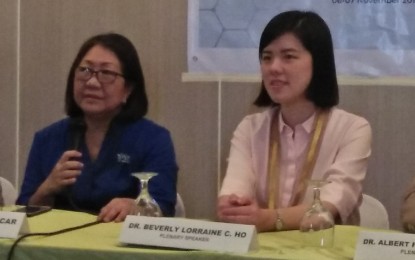
ILOILO CITY — The enactment of the Universal Health Care Bill into a law could be the government’s Christmas gift to the Filipino people if passed before the year ends.
In a press conference here Tuesday, Dr. Berverly Lorraine C. Ho, chief of the Research Division at the Health Policy Development and Planning Bureau of the Department of Health (DOH), said the House of Representatives and the Senate are supposed to meet for a bicameral conference on November 19.
Already, two to three conferences were held in preparation for the actual bicam. She said the DOH have no control over its passage because it is a legislative concern.
“We are hoping that one day is sufficient to settle the differences in the versions and hopefully the best case scenario is after that day, we will be able to submit it to the President. And we are hoping that it’s a Christmas gift to the Filipino people,” she said.
The version of the House of Representatives was passed September 2017 while that of the Senate was in October this year. “It contains a lot of important reform steps,” she said.
Among the significant points are the consolidation of fund sources intended for health with the Philippine Health Insurance Corporation (PhilHealth); provide the foundation for the primary health care system; institutionalize the health technology assessment and integration of health services at the provincial level.
In the proposal, PhilHealth will be the main payer, which is why it needs bigger funds. Funds used by the DOH to purchase commodities will be shifted to PhilHealth. Other sources would be the Philippine Charity Sweepstakes Office, Philippine Gaming Corporation and the proposed round two of the Sin Tax Law.
Moreover, the primary health care system would ensure that every Filipino family will have a primary care provider team. Before their health condition worsens, they have a primary care team that takes care of the family, Ho added.
The bill pushes for a return service provision requiring all graduates of health care professionals from public schools to serve in underserved areas, she said.
The health technology assessment is a process using a research to determine what services and how much will be paid for by the government.
Meanwhile, the provision of integrated health services will cut across provincial limitations.
“There will be no geopolitical division among us. We will provide access,” said Dr. Marlyn W. Convocar, Regional Director of DOH Center for Health Development in Western Visayas.
Ho was in Iloilo for the two-day (Nov. 6-7) 3rd Western Visayas Health Research Conference, which was organized by the Western Visayas Health Research and Development Consortium in partnership with the Department of Health, Department of Science and Technology and the Philippine Council for Health Research and Development. (/PNA)
